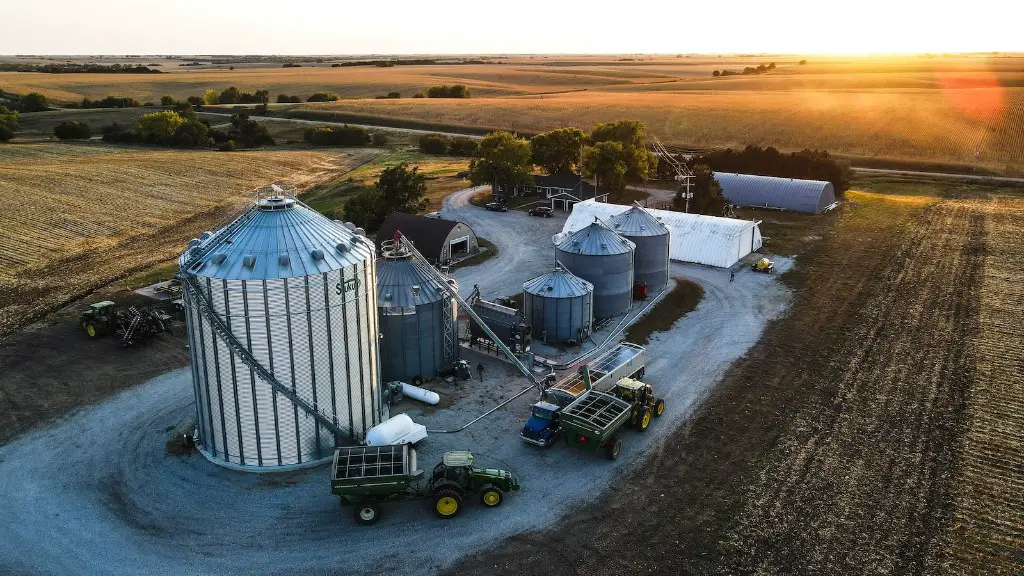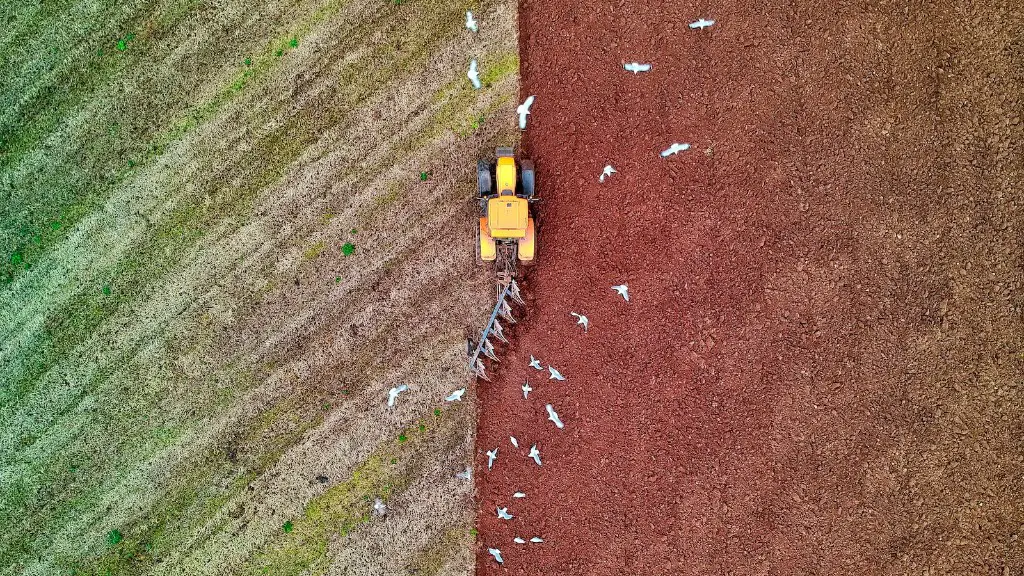N Nigeria is a country located in West Africa. The country is blessed with an abundance of natural resources, including fertile soils and a favorable climate for agriculture. However, the sector remains underdeveloped and plagued by a number of challenges. In this article, we will discuss some of the ways in which Nigeria can improve its agriculture sector.
Nigeria is a country located in West Africa with a population of over 170 million people. The agricultural sector in Nigeria employs over 40% of the country’s workforce and contributes about 24% to the GDP. Nigeria’s climate and soils are suitable for a variety of crops such as cassava, yams, maize, rice, sorghum, millet, cocoa, coffee, palm oil, and rubber. However, the sector is often hampered by a lack of access to good quality seeds, fertilizer, and irrigation facilities. In order to improve agriculture in Nigeria, the government needs to invest in infrastructure and provide farmers with access to resources. The government also needs to create policies that will encourage private sector investment in the sector.
How can we improve agriculture?
Farmers are the backbone of any country as they are the ones who produce food for the entire population. However, farming productivity has been declining in recent years due to various reasons such as climate change, pests and diseases, and soil degradation.
There are various measures that can be taken to improve farming productivity. One of the most important measures is to implement land reforms. Land reforms can help improve the land tenure system, making it more equitable and efficient. This can help increase production as well as incomes of farmers.
Other measures that can be taken to improve farming productivity include planting more densely, planting many crops, raised beds, smart water management, heat tolerant varieties, and use of nitrogen. All of these measures can help improve yields and incomes of farmers.
The government’s efforts to improve agriculture include building infrastructure such as roads, irrigation canals and markets for agricultural products. The government also encourages improvement of farmer institutions both through farmer groups and organizations that overshadow farmers.
How can agriculture be developed in Nigeria
This is a great idea! The government should definitely encourage farmers by giving them loans for agricultural activities. This will help farmers meet up with financial needs in terms of purchasing some seeds, hiring machines etc. and will ultimately help boost agriculture in Nigeria.
It is estimated that by the year 2022, the agricultural sector in Nigeria will be greatly affected by worsening insecurity, climate change, and poor funding for research and development. These issues will have a significant impact on the ability of farmers to produce food and other crops, as well as the overall profitability of the agricultural industry. In order to ensure the continued success of the agricultural sector, it is essential that these issues are addressed in a comprehensive and effective manner.
What 5 things can we do to improve agriculture?
In order to increase crop yields, farmers need to adopt high-yielding crops, boost irrigation, and use more fertilizers. In addition, they need to improve market access, regulations, and governance. Finally, they need to make better use of information technology and adopt genetically modified (GM) crops.
The need to increase agricultural productivity is urgent, due to the limited availability of cultivable land and water resources. Agricultural productivity can be increased by diversifying to value added crops, and by reducing costs, wastages, and pilferage.
What are the solutions to the problems of agriculture in Nigeria?
Agricultural problems in Nigeria are many and varied, but there are solutions to these problems. To address these issues, the Nigerian government and agricultural sector must work together with partners, be innovative, learn from mistakes, provide training and information, and invest in technology. In addition, farmers must be willing to take risks and be active in finding solutions. With these steps, agricultural problems in Nigeria can be overcome.
Land reforms are aimed at improving the efficiency and productivity of land, as well as redistributing land ownership to benefit the rural poor. tenancy reforms are designed to improve security of tenure for tenants, regulation of higher rents and provision of credit to rural farmers. subsidies, such as the urea subsidy, food security act 2013 and public distribution system, help to ensure food security for the rural population. minimum support price and procurement pricing system help to protect farmers from exploitation and ensure that they receive a fair price for their produce.
What can government do to improve agriculture
The Paramparagat Krishi Vikas Yojana (PKVY) is a scheme launched by the Indian government to encourage farmers to adopt organic farming methods. Under the scheme, farmers will be given financial and technical assistance to form groups or clusters and take up organic farming over large areas. The main objective of the scheme is to promote sustainable agriculture and improve the livelihoods of farmers.
Lack of social amenities and poor infrastructures is another issue limiting the success of agriculture in the country. Most farmers in Nigeria reside in remote areas, where basic amenities like water, electricity, and so on are absent. This makes farming difficult for the farmers and limits the success of agricultural production in the country.
Why agriculture is underdeveloped in Nigeria?
The factors limiting agricultural productivity in Africa are many and varied. They include poor land tenure system, low level of irrigation farming, climate change and land degradation. Others are low technology, high production cost and poor distribution of inputs, limited financing, high post-harvest losses and poor access to markets.
The good news is that there are many initiatives underway to address these challenges. One example is the African Union’s Comprehensive Africa Agriculture Development Programme (CAADP), which aims to boost agricultural productivity and incomes across the continent.
Other initiatives include the development of new technology and innovative approaches to farming, such as precision agriculture. This is where farmers use data and technology to more accurately target their inputs, such as seeds, water and fertiliser. This can help to improve yields and reduce costs.
Other efforts to improve agricultural productivity in Africa include promoting irrigation, investing in rural infrastructure, improving access to markets and improving land tenure systems.
There is no one-size-fits-all solution to the problem of low agricultural productivity in Africa. It will require a concerted effort from all stakeholders – including governments, the private sector, NGOs and farmers themselves – to make progress.
The deteriorating security situation in Nigeria is the primary reason for the decline in crop production. The Boko Haram conflict, kidnapping for ransom, farmer-herder clashes, and ethnic clashes have all contributed to the insecurity in the country. This has led to farmers being unable to access their farms, and when they are able to, they are often unable to produce enough crops to meet the demand.
What are two solutions to the problems of agricultural development in Nigeria
There is no one-size-fits-all solution to the problem of outdated farming equipment. However, a few possible solutions include: (a) farmers forming cooperatives to purchase modern machines and using them in turn; (b) the government encouraging local fabrication of suitable intermediate machinery; and (c) the government providing credit facilities to farmers to enable them to purchase modern machineries. Whichever solution is adopted, it is important that the government provides adequate support to farmers to ensure that they are able to upgrade their equipment and improve their productivity.
Climate change, soil erosion, and biodiversity loss are just some of the many challenges farmers face. They must also deal with consumers’ changing tastes and expectations, as well as rising demand for more food of higher quality. To meet these challenges, farmers need to invest in farm productivity and adopt new technologies.
What are seven problems facing agricultural extension in Nigeria?
Agricultural extension is the process of transferring technical knowledge and skills to farmers and other stakeholders to improve agricultural productivity. However, there are several challenges associated with providing extension services to nomadic farmers.
Firstly, there is inadequate funding for agricultural extension activities. This limits the ability of extension workers to reach and engage with nomadic farmers. Secondly, extension workers are often not adequately trained to work with this target group. This can lead to extension messages not being properly understood or properly delivered.
Furthermore, there is often a lack of agricultural extension policy in place to guide extension work with nomadic farmers. This can create a situation where extension workers are not sure of what they should be doing or how they should be doing it. Additionally, gender inequality and imbalances can be a major issue in extension work with nomadic farmers.
Lastly, the migratory nature of nomads can make it difficult to provide extension services on a regular basis. This can make it difficult for extension workers to establish trust and rapport with nomadic farmers.
There are two large problems facing agriculture in the modern world. The loss of agricultural land through erosion and manmade factors is one of them. The other is the increasing lack of diversity in crops.
The loss of agricultural land is a huge problem because it reduces the amount of land available to grow crops. This problem is compounded by the fact that the loss of land is often due to manmade factors, such as development and farming practices that lead to soil erosion.
The lack of crop diversity is also a major problem facing agriculture. This lack of diversity makes crops more susceptible to disease and pests, and it also decreases the nutritional value of the crops. This is a serious problem because it can lead to hunger and malnutrition in populations that rely on agriculture for their food.
Warp Up
It is estimated that over 80% of Nigeria’s population is involved in some form of agriculture. The sector is a key driver of growth and development in the country, accounting for about 24% of GDP and employing about 60% of the workforce. Despite its importance, the sector remains largely underdeveloped, with low productivity and little value addition. In order to improve agriculture in Nigeria, the government has introduced a number of initiatives, including the Greenhouse Technology Programme, the Fadama III Extension and Advisory Services Project, and the National Agricultural Seed Council. The private sector has also been active in developing the sector, with a number of companies investing in agricultural research and development, as well as in initiatives to improve farmer productivity.
The Agricultural sector in Nigeria is the bedrock of the nation’s economy and it is essential for the country’s development. The sector is however faced with a number of challenges that need to be addressed in order to improve the sector and contribute effectively to the country’s economy. Some of the key challenges faced by the agricultural sector in Nigeria include: lack of access to farmland, poor infrastructure, lack of modern technology, poor access to credit and markets, and weak institutions. In order to address these challenges and improve the agricultural sector in Nigeria, the government and other stakeholders need to invest in infrastructure, provide access to credit and markets, and strengthen institutions.





